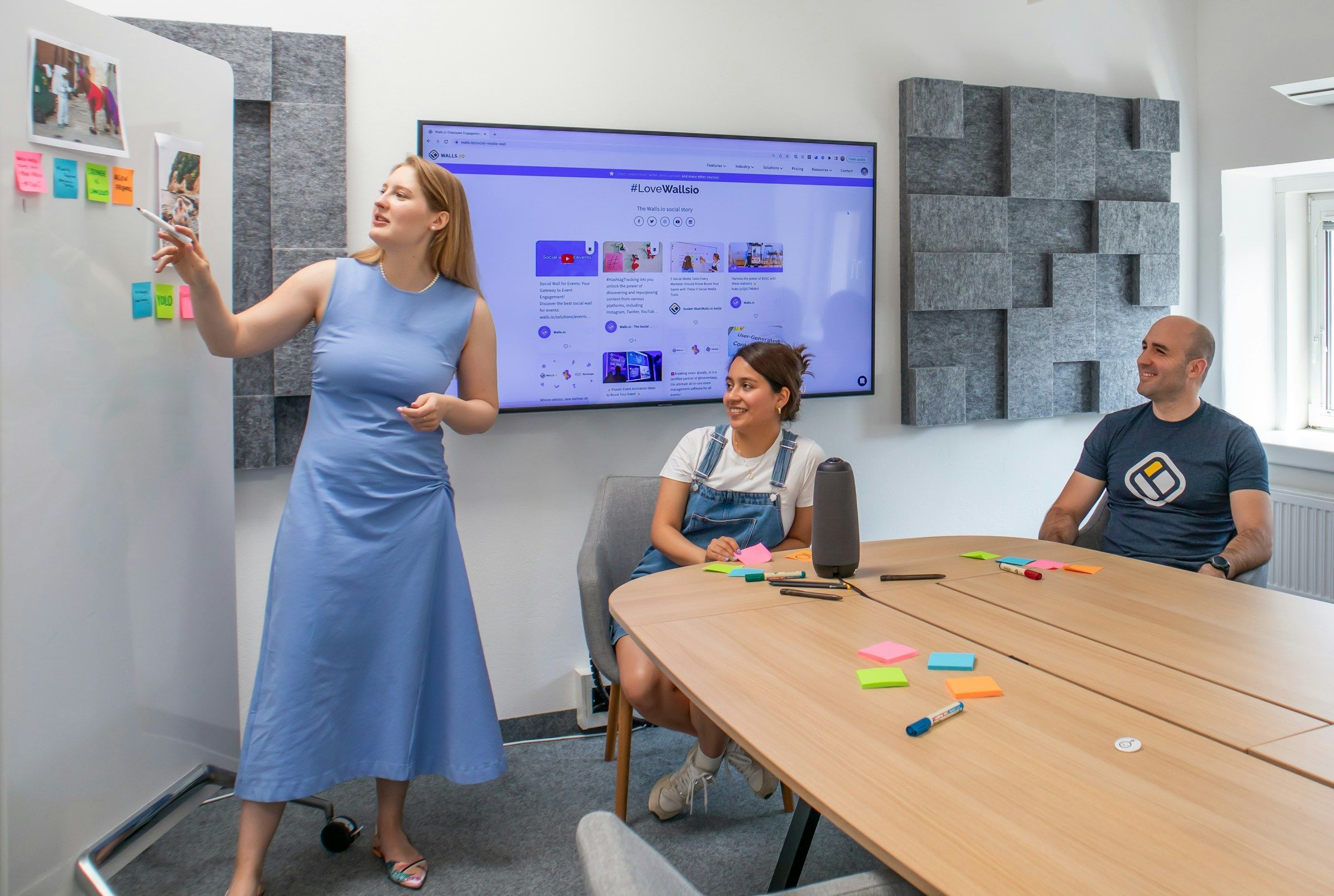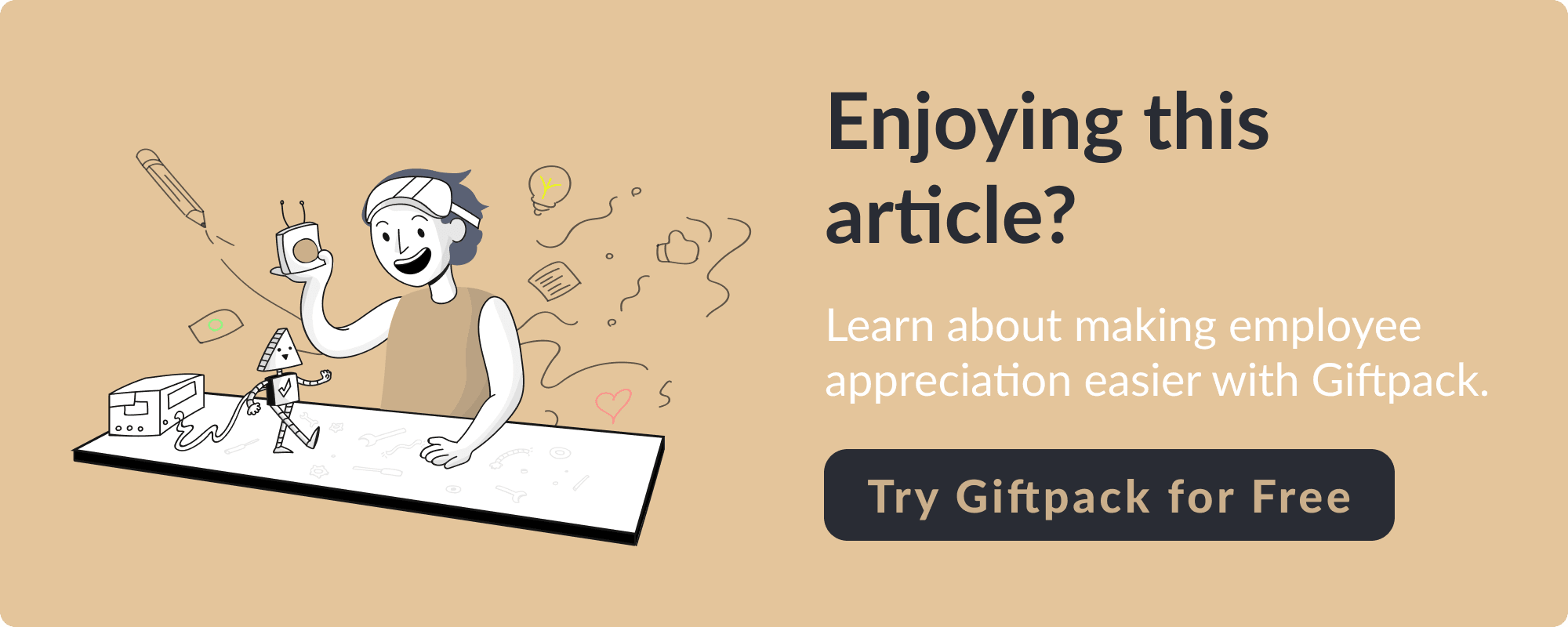
Starting a new job is exciting, but the first days can be nerve-wracking. New hire orientation is your chance to make a positive first impression and set the tone for the onboarding experience. It’s about more than just delivering information; it’s about engaging new employees and setting them up for success. This article will give you creative ideas to shake up your new hire orientation presentations and create an inclusive onboarding experience that leaves new employees feeling excited and motivated.
One way to make your new hire orientation presentations more engaging is to incorporate company branded swag from Giftpack. Swag can help break the ice, build morale, and foster a sense of belonging.
What is New Hire Orientation?

New hire orientation is your chance to set the groundwork for new employees. It’s the first step to show them how things run. This is where they learn about their role, meet their team, and get to know the company’s operations. Picture it as a hands-on guide to getting started.
You want them to hit the ground running, equipped with the necessary skills, tools, and support. Companies see orientation as a straightforward process where employees sort out the paperwork, understand the rules, and get to work.
The Emotional Side of New Hire Orientation
Orientation isn’t just about processes and rules. It’s also about creating a connection. You need to engage your new hires emotionally. How? Share the company values. Show them how they can make a meaningful impact.
Find personal ways to make them feel welcome and wanted. This is key to building engagement. It’s about knowing what to do and feeling motivated and part of something bigger.
Orientation Versus Onboarding: The Big Picture
Think of orientation as the kickoff to the broader onboarding process. It introduces employees to the company and their role. Onboarding is a longer journey that helps new hires acclimate to the organization.
Orientation might last a few days to a week. Onboarding can last at least ninety days, sometimes stretching to a full year. Each step builds on the last, ensuring employees are fully integrated and engaged.

17 Best New Hire Orientation Presentation Ideas for HR Teams

1. Skip the Overload of Facts, Figures, and Flowcharts
On their first day, new hires are already processing many new faces, a new environment, and a flood of new information. Bombarding them with:
- Detailed data
- Flowcharts
- Endless facts
History can feel overwhelming about the company and cause important points to be overlooked. Focus on what’s truly essential for day one.
Introduce the company’s mission, core values, and a few highlights of the company culture to set the stage. Consider spreading the onboarding content over several days or weeks, prioritizing the most immediate needs, like understanding the company’s mission and immediate job responsibilities.
Tip: Present these essentials using storytelling to engage new hires. Instead of a slide full of numbers, share an anecdote about a recent team success or a memorable customer interaction to illustrate company values.
2. Ensure a Fully Set-Up Workspace and Equipment
One of the most practical yet impactful ways to welcome a new employee is to ensure they have a fully functional workspace and all the tools they need from day one. This includes hardware (e.g., laptop, phone), software and systems access (email, shared drives, and necessary apps), and other office essentials. This preparation shows that the company values their time and productivity. It also saves the new hire from the frustration of waiting for tech support or hunting for access.
Tip: Create an IT checklist to ensure everything is ready before they arrive. This may include setting up their workstation, ensuring Wi-Fi access, and providing login credentials for key software. A “getting started” guide specifically for tech use (setting up email, accessing files, etc.) can also make their first day smoother.
3. Pair Them with a Buddy
Assigning a buddy is a simple but highly effective way to help a new hire feel more at ease. The buddy is a friendly point of contact who can answer questions, guide them through daily routines, and help them understand the company culture. This support system encourages social integration and allows the new hire to ask questions without feeling like they’re interrupting their manager or HR.
Tip: Pick a buddy who embodies company values, has good communication skills, and is approachable. To make the buddy program successful, provide a structure: for example, set up a weekly check-in or coffee chat for the first few weeks to keep the relationship active.
4. Make It Special with Team Lunch and a Welcome Kit
First impressions are powerful, and a team lunch is a perfect opportunity to make the new hire feel like part of the family. Sharing a meal with the team in a relaxed setting fosters bonding and allows everyone to get to know each other personally.
Complement the experience with a welcome kit that includes branded items, like:
- T-shirt
- Notebook
- Pen
- Water bottle
These small items serve as mementos that reinforce company pride and help the new hire feel connected to the brand.
Tip: Personalize the welcome kit with a handwritten note from the manager or team members. A thoughtful message can add a warm, personal touch that makes them feel valued immediately.
5. Give a Tour and Share Local Tips for On-Site Workers
For on-site roles, orientation should include a physical tour of the workspace to show new hires where everything is located, such as break rooms, meeting rooms, restrooms, etc. Knowing the layout of the office can reduce anxiety about navigating the new environment.
Providing a list of nearby amenities, such as:
• Cafes • Convenience stores • Gyms
This can be especially helpful for new hires unfamiliar with the area. Mentioning local landmarks or popular lunch spots can help new hires feel at home and settle quickly.
Tip: Include a map of the area with these local tips. This extra touch shows you’re thinking about their comfort beyond just the workspace, making it easier for them to find places to unwind or grab lunch.
6. Share a Company Jargon Glossary
Every workplace has its own set of acronyms, buzzwords, and insider terms that can leave new hires feeling out of the loop. A glossary of common terms, acronyms, and industry-specific jargon can help them feel more confident in meetings and conversations. This small step saves them from confusion and allows them to follow discussions easily.
Tip: Make the glossary digital so it’s easy to update as the company evolves. Some companies even use online platforms or wikis where employees can add terms or definitions. This collaborative approach keeps the glossary relevant and comprehensive.
7. Discuss the Org Chart and Their Role
An organizational chart can help new hires understand how the company is structured and where they fit within it. Walk them through the org chart, highlighting key leaders, departments, and teams.
Take time to explain the importance of their role within the organization, including how their responsibilities impact other teams and contribute to broader company goals. This builds a sense of purpose and allows them to see where to direct questions or ideas.
Tip: To make the hierarchy feel approachable, include short bios or fun facts about key team members alongside the org chart. Consider creating a digital org chart they can reference later as they learn more faces and names.
8. Encourage New Hires to Suggest Improvements
New hires bring fresh perspectives that can be incredibly valuable, especially for processes that long-time employees might overlook. Encourage them to give feedback on the onboarding experience or suggest ways to improve existing processes. They’ll appreciate that the company is open to new ideas, and you’ll benefit from insights you might not have considered.
Tip: Set up a suggestion box (physical or digital) for onboarding feedback, or include a feedback session at the end of the orientation process. Letting them know they can influence improvements is a great way to empower new hires.
9. Assign a Small Starter Project
Giving new hires a small, manageable task on the first day can help them feel productive and build their confidence. Choose a low-pressure but relevant project that allows them to dive in and start contributing without feeling overwhelmed. This project helps them practically familiarize themselves with systems, tools, and team workflows, providing an opportunity to learn by doing.
Tip: Follow up with them after completing the task to provide feedback, answer questions, and gauge their comfort level. This will set the tone for open communication and give them a sense of accomplishment early on.
10. Provide welcome packages
To prepare them for their first day, greet employees with a welcome package. Provide company essentials like the employee handbook and relevant technology setup guides. You can also offer an onboarding checklist or agenda to give them a sense of what to expect in the first few weeks.
Include fun gifts to make them feel excited to work with you. Consider offering company swag, like a comfy sweatshirt or high-quality drink tumbler. You could also give something practical, like a multi-device desk charger. Another nice touch is a handwritten note from managers and coworkers welcoming new hires to the team.
11. Invite current employees to share their experiences
New employees want to hear from people “on the ground,” so to speak, not just from managers. Include recently hired teammates and more seasoned ones in welcome meetings (keeping sessions to about eight attendees to avoid overwhelming new hires). The former will easily recall what it’s like to start working and offer insights on navigating that challenge.
The latter can chat about how they’ve grown with the company (and how the company changed as it scaled). This chat allows new hires to ask questions and better understand the company’s history, culture, and professional development opportunities.
12. Create a company culture presentation
Are you looking for presentation ideas for new hire orientation? Understanding a company’s culture can be challenging, especially for new employees. And simply stating company values isn’t often enough. The way your team demonstrates these values via their actions truly shows your company culture. A cultural pillar might be transparency. That’s great in theory, but sharing how hosting regular check-ins with external stakeholders gained you the trust to kick off a lofty project more effectively illustrates this.
Consider creating a show-and-tell presentation explaining how the company’s values and mission drive tangible business results. Include brief introductions from various employees about who they are, why they love working at the company, and what accomplishments they’re most proud of. If you do this remotely or with hybrid teams, use Fellow’s collaborative meeting notes app so new employees can see how meetings are structured and add their questions ahead of time. They’ll be involved without feeling the pressure of coming up with questions.
13. Surprise Guests
Most new employee orientations will have more than one speaker. You usually get involvement from various subject matter experts who may help teach some of the material. That is great and does help keep things more interesting. Even better? A surprise guest.
What is a surprise guest? Someone not on the agenda shows up at the orientation unbeknownst to the group. Of course, you will have arranged and scheduled it beforehand, but for the audience, it will be a surprise.
14. Organize a virtual scavenger hunt of company resources
Your company might have an online hub for employee resources, such as benefits information, reimbursement forms, and department directories. Make a fun way to teach new employees how to find that information.
Develop a list of common tasks, such as “I want to submit a vacation request,” and questions an employee might have, such as “What are our insurance provider’s qualifying life events?” This will help the new hire know where to get answers and also highlight how you can improve information documentation.
15. Contextualize new hires’ roles right from the start
Introduce new employees to staff in different departments, even if you’re onboarding remotely. Although they may not work with these people daily, it’s a useful way to welcome them to the wider business and show them where their work fits into the bigger picture.
It also affords them the chance to explore potential areas for development. Ensure the company’s values, mission, and purpose are communicated and reiterated during onboarding. Alignment from the get-go is a great way to make employees feel invested.
16. Regardless of how small your team is, get social
Research suggests that the more “authentic” employees feel at work, the more engaged, productive, and satisfied they are. Encourage new hires to feel comfortable being themselves. Organize social calls, happy hours (virtual or in-person), and lunches in their first few weeks.
Colene Rogers, an HR professional at Syntech Systems, found that asking a new hire to lunch on their first day was one of their “fondest onboarding memories.”
17. Game Show
Game shows are all the rage, and one of our favorites is classic Jeopardy, which can be easily integrated into a first-day orientation. Whether you give employees the handbook ahead of time and quiz them on their research or you play after the initial presentation, Jeopardy is a great team-building activity that’s sure to engage your new hires.
For a seamless and impactful onboarding experience, consider using a client gifting service to enhance the welcome process. Try Giftpack's client gifting service for free today.

Related Reading
• Small Business Onboarding • Onboarding Remote Employees • Onboarding Phases • New Team Member Announcement • Onboarding Meeting • New Hire Onboarding Survey Questions • New Hire Orientation Survey • Onboarding and Training • Onboarding Goals
Why Does New Hire Orientation Matter?

1. Building Loyalty from Day One
Retaining top talent in today's competitive landscape demands more than a hefty paycheck. Employees now seek meaningful experiences and a sense of belonging. A well-crafted orientation program can be the cornerstone of this connection.
It sets the tone, shapes perceptions, and fosters a supportive environment. Executives can create an experience encouraging new hires to stay and thrive by prioritizing relationship-building and a welcoming atmosphere.
2. Creating a Sense of Security
New hires often face a whirlwind of uncertainty on their first day. A comprehensive orientation program can ease these anxieties by clarifying roles and expectations. It introduces them to key team members, including executive leadership, which helps them feel valued and important from the start. When new employees feel informed and confident, they can integrate more seamlessly and contribute effectively.
3. Reducing Turnover's Hidden Costs
The phrase "employees quit bosses, not jobs" rings true. New employees might need a proper orientation to find their footing, leading to frustration and early departures.
The cost of turnover goes beyond recruiting expenses. It disrupts productivity and team dynamics. By investing in an effective orientation, companies can reduce turnover rates and foster a more cohesive and motivated workforce.

Related Reading
• How to Influence Culture in the Workplace • How Long Does It Take to Onboard a New Employee • How to Onboard Remote Employees • How to Onboard New Employees • How to Improve Onboarding Process • How to Create an Onboarding Process • How to Improve Connection in the Workplace • How to Build High Performing Teams • Effective Onboarding • Remote Onboarding Best Practices • Best Onboarding Programs • Fun Onboarding Questions for New Hires • Onboarding Activities
Common Mistakes To Avoid at New Hire Orientation Presentation

1. Lack of Preparation and Structure: The Chaos of Winging It
Failing to prepare a clear agenda or structure for your new hire orientation can confuse your team and new hires. Improvisation might seem spontaneous, but it often results in disorganization and missed information.
Craft a detailed timeline of topics, ensuring each session builds on the last. This way, new hires know what’s coming and can absorb information without feeling lost in details.
2. Overloading with Information: When More is Less
Nobody likes drinking from a fire hose, especially on their first day. Bombarding new hires with endless facts and policies will only overwhelm them. Break down essential information into digestible chunks. If needed, spread sessions over several days.
Use videos, quizzes, and interactive discussions to keep them engaged and help the material stick. The goal is clarity, not chaos.
3. Neglecting Company Culture: Missing the Soul of the Workplace
A new hire orientation that skips over company culture needs to catch up. You want your new employees to connect with the workplace, not just the tasks. Share the organization’s mission, vision, and values. Help them see how their role fits into the bigger picture. Use storytelling to make it memorable. This isn’t just a job. It’s a community.
4. One-Way Communication: The Lecture Trap
Don’t fall into the trap of lecturing your new hires. This approach can quickly lead to boredom and disengagement. Instead, create an interactive environment where they feel comfortable asking questions and sharing their thoughts. Introduce icebreakers, group activities, and opportunities for discussion. It’s about building a dialogue, not delivering a monologue.
5. Ignoring Individual Needs: One Size Doesn’t Fit All
Treating all new hires the same is a surefire way to alienate them. Each person brings unique experiences and learning styles to the table. Personalize the orientation by acknowledging their backgrounds and tailoring content to their specific roles. This approach will boost engagement and satisfaction, helping them feel valued.
6. Abrupt Endings Without Follow-Up: Leaving Them Hanging
Ending the orientation abruptly without any follow-up can leave new hires feeling abandoned. Set clear expectations for what comes next. Establish a transition from orientation to ongoing training or onboarding processes. Schedule follow-up meetings or check-ins with managers or mentors. This helps them feel supported as they settle into their new roles.
7. Neglecting Feedback Opportunities: Missing a Chance for Growth
Ignoring feedback from new hires about their orientation experience is a missed opportunity for improvement. Encourage them to share their thoughts on what worked and what didn’t. This helps you refine the process and shows them that their opinions are valued. It’s a simple step that can lead to a stronger orientation program.

Build A Meaningful Employee Recognition Program With Ease with Giftpack's Client Gifting Service
Giftpack simplifies corporate gifting, turning it from a chore into a strategic advantage. Our custom AI algorithm curates personalized gifts from over 3.5 million products, considering individual preferences, social media activity, and digital footprint. This approach ensures meaningful connections, whether the recipient is an employee, customer, or VIP client.
Try Giftpack's client gifting service for free today.
Related Reading
• Fun Ways to Introduce New Team Members • New Hire Training Plan • HR Onboarding Checklist • Best Practices for Onboarding New Employees • New Hire Orientation Best Practices • New Employee Checklist • New Employee First Week Schedule Template • New Hire Welcome Kit • Onboarding Gifts for New Hires
Make your gifting efficient and improve employee attrition rates with Giftpack AI
Visit our product page to unlock the power of personalized employee appreciation gifts.